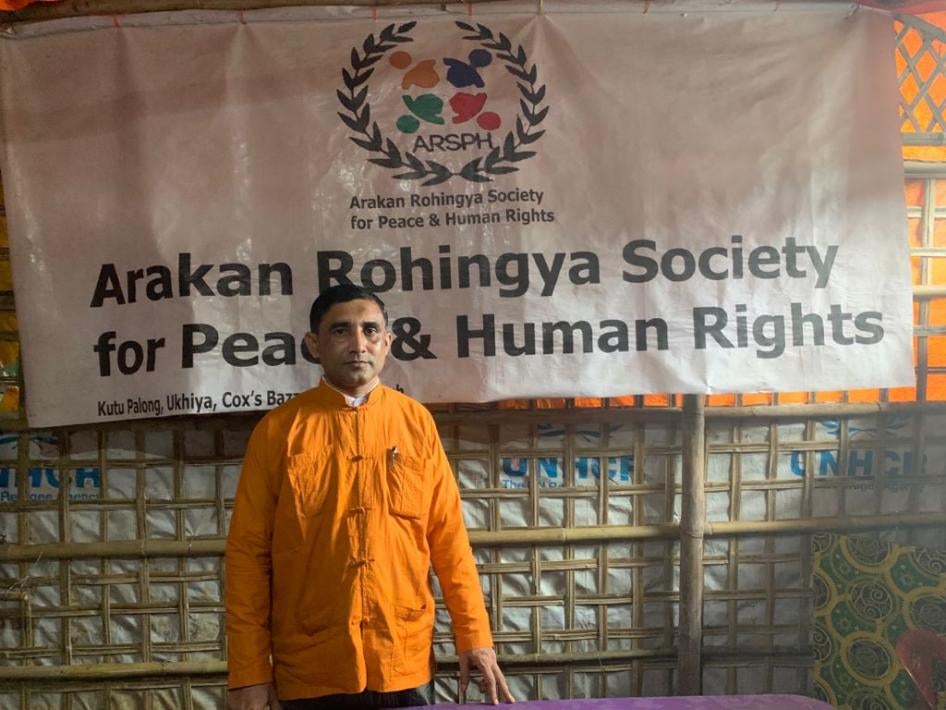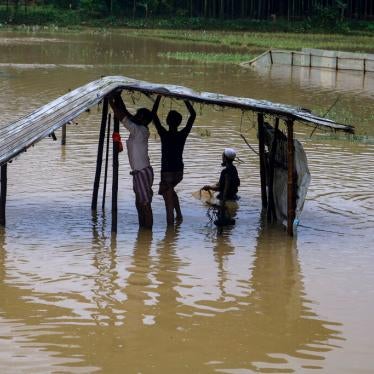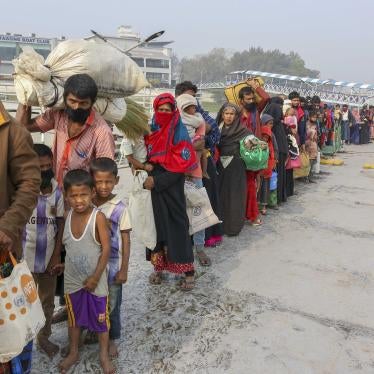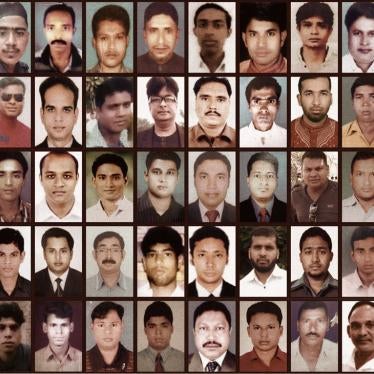(New York) – Bangladesh authorities and United Nations officials should take urgent measures to protect Rohingya refugees facing threats and violence in the Cox’s Bazar camps, Human Rights Watch said today. Rohingya community leaders and volunteer workers told Human Rights Watch that alleged members of armed Islamist groups were increasingly targeting them for extortion and other crimes.
On September 29, 2021, unidentified gunmen shot and killed Mohib Ullah, 46, chair of the Arakan Rohingya Society for Peace and Human Rights (ARSPH), in Kutupalong camp in Cox’s Bazar. His associates said that Mohib Ullah had repeatedly reported threats from armed groups operating in the camps to Bangladesh officials but received insufficient support from the authorities.
“Mohib Ullah’s flight from mass atrocities in Myanmar to then be killed in his place of refuge speaks volumes about the risks that Rohingya activists face every day,” said Meenakshi Ganguly, South Asia director at Human Rights Watch. “Bangladesh authorities should take urgent measures, with international assistance, to protect Rohingya activists who are defending the rights of refugees.”
Human Rights Watch interviewed nine people, including Rohingya activists and Mohib Ullah’s family members, who said that the authorities did not adequately investigate Mohib Ullah’s concerns or provide protection for him and other vulnerable activists. “The Bangladesh government deployed many security forces in the camps, but they were busy subduing and controlling refugees instead of protecting them,” said one activist.
At least a dozen activists have come forward to seek protection from the UN refugee agency, UNHCR, and Bangladesh officials since Mohib Ullah’s killing because of renewed threats from armed groups and other risks of violence. Humanitarian workers said that the environment inside the camps has become increasingly dangerous for Rohingya activists.
Mohib Ullah had served as a leader among the nearly one million Rohingya refugees in Bangladesh. He began receiving death threats in 2019 as his prominence grew, representing the Rohingya at the UN Human Rights Council and with the United States government. His organization said that the threats were from the Arakan Rohingya Salvation Army (ARSA) and other armed groups that contested his leadership role.
In the months before his death, Mohib Ullah had expressed concern about the growing threats, activists and his family members said. In August, he sent a letter to the Bangladesh government Refugee Relief and Repatriation Commissioner, with copies to the camp-in-charge official and Special Branch in Cox’s Bazar, outlining the death threats that he and his colleagues had been receiving and requesting the office take action against the assailants, which the letter identifies as ARSA members.
One member of Mohib Ullah’s group was told in July that he would be killed if he returned to the group’s office, and that “very soon we will kill your leader.” Mohib Ullah’s colleagues said the letter received no reply.
A Bangladesh police official told Reuters they had received no reports from Mohib Ullah about any threats or requests for protection.
ARSA condemned the killing in written and audio statements and demanded authorities bring those responsible to account.
In a statement, UN High Commissioner for Human Rights Michelle Bachelet said that Mohib Ullah’s death “is a clear example of the insecurity in the camp, and the apparent attempts to silence moderate civil society voices.”
UNHCR said that, in response to the killing, it “has enhanced its staff presence in the camps to ensure that the Rohingya refugees have direct access to support services and can report their concerns.” However, activists close to Mohib Ullah said that they have not been provided with adequate protection.
On October 3, police reported that they had arrested five men in connection with the killing. Mohib Ullah’s associates, however, have said that those allegedly responsible for the killing are still openly operating in the camp.
An activist with his group said, “Even this morning [October 3] some people visited my shelter and threatened my family saying, ‘Ask your son to be ready because the same fate is awaiting him, like Mohib Ullah. He is on the hit list of 10 people.’ I informed camp-in-charge, who assured me of safety, but I am worried because the police are not there all the time. If they really want to kill me, I’m an easy target for them.” Mohib Ullah’s wife said that she was worried for her daughters since her husband’s killing because of recent threats demanding that they marry members of the armed group.
Some refugees alleged that Bangladesh security forces and camp authorities seemed to underplay threats from armed Islamist groups. “When we complain to the authorities about ARSA’s crimes, they don’t pay any attention,” an activist said.
Another activist alleged collusion between some officers of the Armed Police Battalion deployed in the camps and members of the armed group. He said he went into hiding after receiving threats from ARSA but returned to his shelter when police promised protection, only for them to hand him over to the militants. “I was always being threatened by ARSA members since I started working as an activist, and I finally went into hiding. A few months later, two police officers lured me to come back to the camp and then handed me over to ARSA. I had to go through inhuman torture, until I paid ARSA a heavy ransom.”
ARSA members have attacked Christians and Hindus living in the camps alongside the predominantly Muslim Rohingya. Armed groups have also targeted women working as volunteers with humanitarian agencies. Hasina, a 26-year-old activist who works on women’s empowerment, said she was a victim of extortion by ARSA members.
Bangladesh authorities should fully investigate all those who might be responsible for Mohib Ullah’s killing and work with UNHCR to respond promptly when refugees are reporting imminent threats and provide immediate and effective protection, Human Rights Watch said. Concerned governments should ensure that activists and other refugees at heightened risk are priorities in planning around refugee assistance, protection, and resettlement.
“The Bangladesh government needs to address safety in the Rohingya camps both by developing better security and taking necessary action against groups engaged in illegal activity,” Ganguly said. “These refugees fled horrific abuses and are entitled to support from Bangladesh and other governments to live in the camps without fearing for their lives.”








